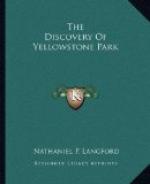of these projects before they grew large enough
to be made public.
One of these men was William Hallett Phillips, a dear friend of mine, a resident of Washington, a Supreme Court lawyer with a large acquaintance there, and a delightful fellow. He was the best co-worker that any one could have had who wanted to keep things straight and as they ought to be.
At rare intervals I get out old volumes of the Forest and Stream and look over the editorials written in those days with a mingling of amusement and sadness as I recall how excited we used to get, and think of the true fellows who used to help, but who have since crossed over to the other side.
Yours sincerely,
Geo. Bird Grinnell.
[Illustration: National park mountain. At junction of Firehole and Gibbon rivers.]
[Illustration: Geo. Bird Grinnell]
From Forest and Stream, August 20, 1904.
Senator Vest and the national park.
In no one of all the editorials and obituaries written last week on the death of Senator Vest did we see mention made of one great service performed by him for the American people, and for which they and their descendants should always remember him. It is a bit of ancient history now, and largely forgotten by all except those who took an active part in the fight. More than twenty years ago strong efforts were made by a private corporation to secure a monopoly of the Yellowstone National Park by obtaining from the government, contracts giving them exclusive privileges within the Park. This corporation secured an agreement from the Interior Department by which six different plots in the Yellowstone Park, each one covering about one section of land—a square mile—were to be leased to it for a period of ten years. It was also to have a monopoly of hotel, stage and telegraph rights, and there was a privilege of renewal of the concession at the end of the ten years. The rate to be paid for the concession was $2 an acre.
When the question of this lease came before Congress, it was referred to a sub-committee of the Committee on Territories, of which Senator Vest was chairman. He investigated the question, and in the report made on it used these words: “Nothing but absolute necessity, however, should permit the Great National Park to be used for money-making by private persons, and, in our judgment, no such necessity exists. The purpose to which this region, matchless in wonders and grandeur, was dedicated—’a public park and a pleasure ground for the benefit and enjoyment of the people’—is worthy the highest patriotism and statesmanship.”
The persons interested in this lease came from many sections of the country, and were ably




